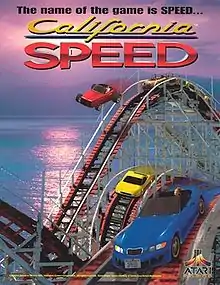California Speed (video game)
California Speed is a racing video game developed and published by Atari Games.[1] The game was first released in arcades (Midway Seattle Arcade System) in 1998 and was ported to the Nintendo 64 in 1999 by Midway Games. This game contains support for the Controller Pak and the Rumble Pak also the full support for multiplayer mode.
| California Speed | |
|---|---|
 Arcade flyer | |
| Developer(s) | Atari Games |
| Publisher(s) | Midway Games |
| Producer(s) | Steve Ritchie |
| Composer(s) | Kevin Quinn, Dave Zabriske, Chris Granner, John Paul, Joe Lyford, Gunnar Madsen, Rich Carle, Todd Modjesky (Arcade) Barry Leitch, Pablo Buitrago (N64) |
| Platform(s) | Arcade, Nintendo 64 |
| Release | Arcade
|
| Genre(s) | Racing |
| Mode(s) | Single player, multiplayer |
Gameplay
California Speed is set on many cities on the outskirts and streets across the state of California. The feat. Players compete against different racers on the track. Traffic can appear on races which players must avoid. Stunts such as jumps appear on many tracks in the game to allow an extra feature to appease players. Players can race with several different cars, including a golf cart, with the automatic or manual transmissions, and can alter the colors.
Mojave Desert Billboard
In April of 2012, a post was made to the r/creepygaming subreddit about a mysterious billboard discovered in the "Mojave Desert" level of the game.[2] The billboard bore black text on a white background with the following message:
SoMETIMES
God TaKes MOMMIES
aNd PuPPIES AWAY…
And SoMETIMES…
Just SoMETIMES…
I do.
The comments on the reddit thread expressed surprise at the inclusion of the creepy message within an otherwise innocuous game.[2]
The reason for the billboard message's inclusion was not known until February of 2016, when the website Popoptic published an article in which Morgan Godat, a textural artist for the game, explained that the game had been created under a serious time crunch.[3]
[W]e were in a tight situation to even get the most basics of the game stood up on the N64, we didn’t have anything handy or relevant to put on the billboards. So I plugged in a placeholder billboard texture so ****ing stupid there would be no way it could possibly be confused for a real shipping asset.
— Morgan Godat
"Crunch time" and a lack of quality control is the likely cause of the billboard making it into the final game.[3]
Reception
| Publication | Score |
|---|---|
| EGM | 4.25/10 (N64)[lower-alpha 1] |
| GameSpot | 4.6/10[5] |
| Next Generation |
Next Generation reviewed the arcade version of the game, rating it three stars out of five, and stated that "in the end, California Speed is aimed directly at the middle of the gaming audience, and it plays that way too."[6]
Notes
- In Electronic Gaming Monthly's review of the Nintendo 64 version, two critics gave it 4.5/10, while the other two gave it a 4/10.[4]
See also
References
- "California Speed". The International Arcade Museum. Retrieved 9 Nov 2013.
- u/YabukiJoe (April 7, 2012). "[California Speed] Ghastly billboard message". r/creepygaming. Retrieved May 31, 2020.
- Randall Rigdon Jr. (February 20, 2016). "Mystery of Creepy 18-Year-Old N64 'California Speed' Easter Egg Finally Revealed". Popoptic. Retrieved May 31, 2020.
- Ricciardi, John; Hager, Dean; Boyer, Crispin; Sushi-X (April 1999). "California Speed". Electronic Gaming Monthly. Vol. 12 no. 4. p. 121.
- Taruc, Nelson (April 28, 2000). "California Speed Review". GameSpot. Retrieved 19 March 2019.
- "Finals". Next Generation. No. 43. Imagine Media. July 1998. p. 120.
